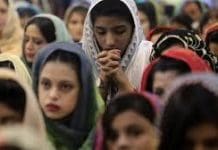Stefan J. Bos, Chief International Correspondent BosNewsLife

BEIJING, CHINA (BosNewsLife)– Chinese Christian activist Hua Zaichen, who became known for helping reportedly persecuted Christians, has died in a Beijing hospital, shortly after his wife was released from prison, his supporters confirmed to BosNewsLife Monday, February 16. Hua was 91 years old.
“Hua Zaichen, went Home to the Lord,” last week, said advocacy group China Aid Association (CAA), which has been in close contact with the family.
He died Monday, February 9, a day after his 79-year-old wife Shuang Shuying was released from prison where she was held for two years on what CAA described as “fabricated charges,” because of her Christian work.
“She went immediately to the hospital to see her husband…Though he did not regain
consciousness, Shuang Shuying sat at his bedside holding his hand. The following day,
Shuang Shuying’s husband passed away,” CAA said.
COUPLE’S “WITNESS”
“We are grateful for the witness of this elderly couple who have laid down their lives for the Truth and for religious freedom in China,” the group added. It stressed that, “Shuang Shuying and her family continue to suffer persecution from Chinese officials.”
Despite the setbacks, Shuang Shuying, said she felt “greatly strengthened” that “brothers and sisters from all over the world had been praying for me.”
In a letter written hours after her release and monitored by BosNewsLife, she said she was put in jail, in part to pressure her son and house church pastor Hua Huiqi to become a spy. She claimed they detained her, “In order to force my son to compromise his faith and betray brothers and sisters.”
Chinese officials have denied wrongdoing. The Chinese government charged her with “willfully damaging public and private property,” including using her cane to destroy the hood of a police car and electronic equipment. But Shuang’s supporters have always maintained that incident happened when she tried to protect herself with a cane against a police car trying to run over her in February 2007.
MISTREATMENT ALLEGED
Shuang said she was often mistreated by representatives of the Public Security Bureau (PSB), one of China’s main law enforcement agencies, and fellow prisoners.
“During my imprisonment, the PSBs of Beijing came to my prison interrogating, threatening and harassing me numerous times. They even directed other prisoners to take off all of my clothes and forced me stand alone outside in the evening without letting me sleep,” the elderly woman wrote.
She said that seven prisoners kept watching her in turn. “I was not allowed to move even when the mosquitoes bit me or I would be slapped on my face and poked in the veins on my hands. I still had wounds that were unhealed on my hands.”
In addition, “PSB officers even forced me to drink my own urine.” Writing and publishing the letter is risky. “They threatened me not to tell anyone about the tortures I experienced,” she explained.
However Shuang made clear she wants the world to know what happened to her and the Christian faith. “During these terrible circumstances, I prayed without ceasing. I asked God to give me strength.”
VERY “ENCOURAGED”
She said she was very encouraged that her case was apparently closely monitored by fellow Christians around the world. “Every time when my son came to visit me and shared with me that brothers and and sisters from all over the world had been praying for me, I felt greatly strengthened and empowered which has enabled me to continue to live.”
She said that she also experienced the power of “continuous prayers, care and support for
my husband, Hua Zaichen,” before he died.
CAA said is has asked Christians to write “an encouraging letter” to Shuang Shuying
“as she rebuilds her life.” It identified her address as Mrs. Shuang Shuying, Room#107,
Building #23. Tai Ping Qiao Xi Li, Fengtai District, Beijing, China 100076.
The reported persecution comes amid reported attempts by China’s Communist authorities
to control the spread of Christianity. Most of China’s estimated 130 million Christians prefer to worship outside the state denominations in underground ‘house churches’ often organized in homes of believers.








